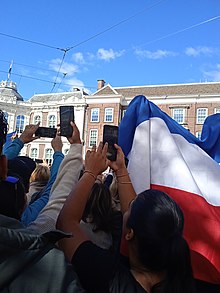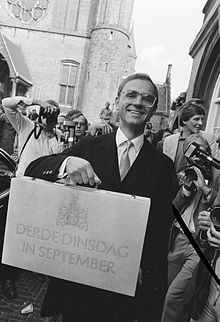
The Parliament of the United Kingdom of Great Britain and Northern Ireland is the supreme legislative body of the United Kingdom, and may also legislate for the Crown Dependencies and the British Overseas Territories. It meets at the Palace of Westminster in London. Parliament possesses legislative supremacy and thereby holds ultimate power over all other political bodies in the United Kingdom and the Overseas Territories. While Parliament is bicameral, it has three parts: the sovereign, the House of Lords, and the House of Commons. The three parts acting together to legislate may be described as the King-in-Parliament. The Crown normally acts on the advice of the prime minister, and the powers of the House of Lords are limited to only delaying legislation.
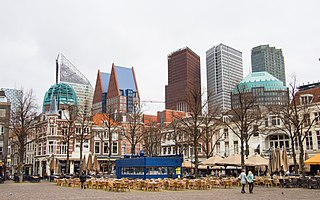
The Hague is the capital city of the South Holland province of the Netherlands. With a population of over half a million, it is the third-largest city in the Netherlands. Situated on the west coast facing the North Sea, The Hague is the country's administrative centre and its seat of government, and while the official capital of the Netherlands is Amsterdam, The Hague has been described as the country's de facto capital since the time of the Dutch Republic.

The Parliament of Canada is the federal legislature of Canada, seated at Parliament Hill in Ottawa, and is composed of three parts: the King, the Senate, and the House of Commons. By constitutional convention, the House of Commons is dominant, with the Senate rarely opposing its will. The Senate reviews legislation from a less partisan standpoint and may initiate certain bills. The monarch or his representative, normally the governor general, provides royal assent to make bills into law.

The States General of the Netherlands is the supreme bicameral legislature of the Netherlands consisting of the Senate and the House of Representatives. Both chambers meet at the Binnenhof in The Hague.

A speech from the throne, or throne speech, is an event in certain monarchies in which the reigning sovereign, or their representative, reads a prepared speech to members of the nation's legislature when a session is opened. The address sets forth the government's priorities for its legislative agenda, for which the cooperation of the legislature is sought. The speech is often accompanied by formal ceremony. It is often held annually, although in some places it may occur more or less frequently, whenever a new session of the legislature is opened.

The Binnenhof and Buitenhof is a complex of buildings in the city centre of The Hague, Netherlands, next to the Hofvijver. It houses the meeting place of both houses of the States General of the Netherlands, as well as the Ministry of General Affairs and the office of the Prime Minister of the Netherlands. Built primarily in the 13th century, the Gothic castle originally functioned as residence of the counts of Holland and became the political centre of the Dutch Republic in 1584. It is counted among the Top 100 Dutch heritage sites. The Binnenhof is among the oldest parliament buildings in the world still in use.

The State Opening of Parliament is a ceremonial event which formally marks the beginning of each session of the Parliament of the United Kingdom. At its core is His Majesty's "gracious speech from the throne", which is read by the monarch but written by HM Government. In the speech the monarch gives notice of forthcoming state visits, before setting out the government's legislative programme for the new parliamentary session. No business of either House of Parliament can proceed until the Sovereign’s speech has been delivered.

The Chamber of Representatives is one of the two chambers in the bicameral Federal Parliament of Belgium, the other being the Senate. It is considered to be the "lower house" of the Federal Parliament.
A government policy statement is a declaration of a government's political activities, plans and intentions relating to a concrete cause or, at the assumption of office, an entire legislative session. In certain countries they are announced by the head of government or a minister of the parliament. In constitutional monarchies, this function may be fulfilled by the Speech from the Throne.
A legislative session is the period of time in which a legislature, in both parliamentary and presidential systems, is convened for purpose of lawmaking, usually being one of two or more smaller divisions of the entire time between two elections. A session may last for the full term of the legislature or the term may consist of a number of sessions. These may be of fixed duration, such as a year, or may be determined by the party in power. In some countries, a session of the legislature is brought to an end by an official act of prorogation, in others by a motion to adjourn sine die. In either event, the close of a session generally brings an end to all unpassed bills in the legislature, which would have to be introduced anew to continue debate in the following session.

The Golden Coach is a coach owned and used by the Dutch royal family. The Golden Coach was used every year to carry the Dutch monarch from the Noordeinde Palace to the Ridderzaal in order to deliver the Speech from the Throne or the wedding of the Prince of Orange or the Princess of Orange. The Golden Coach is stored at the Royal Stables on the Noordeinde Palace grounds in The Hague.
State of the Nation may refer to:
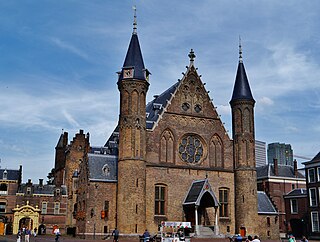
The Ridderzaal is the main building of the 13th-century inner square of the former castle of the counts of Holland called Binnenhof at the address Binnenhof 11 in The Hague, Netherlands. It is used for the annual state opening of Parliament on Prinsjesdag, when the Dutch monarch drives to Parliament in the Golden Coach and delivers the speech from the throne. It is also used for official royal receptions, and inter-parliamentary conferences.
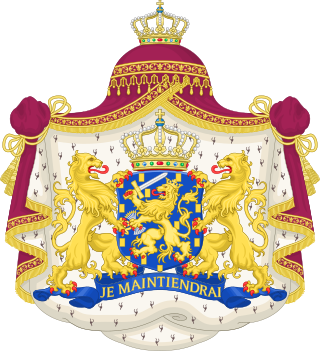
The monarchy of the Netherlands is governed by the country's constitution, roughly a third of which explains the mechanics of succession, accession, and abdication; the roles and duties of the monarch; the formalities of communication between the States General of the Netherlands; and the monarch's role in creating laws. The monarch is the head of state and the de jure head of government of the Netherlands.
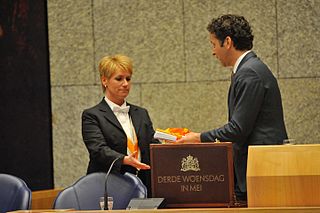
Accountability Day ) is the day in the Netherlands when the national government and ministries present their annual reports to the House of Representatives. On the same day, the Court of Audit publishes its report on the inspections of those annual reports. Accountability Day is held every year on the third Wednesday in May. The annual reports not only account for how much money has been spent and on what; the specific goals that were envisioned, and to what degree they have been achieved in the past year, are also discussed.

The Budget Memorandum is a general explanation by the Government of the Netherlands of the expected revenues and expenses in the National Budget for a year.

The opening of the Parliament of Canada is the commencement of a session of the Parliament of Canada following a general election. It involves summons from the governor general on behalf of the monarch and a ceremony based on the same in the United Kingdom, though less elaborate and now evolved to include uniquely Canadian elements.
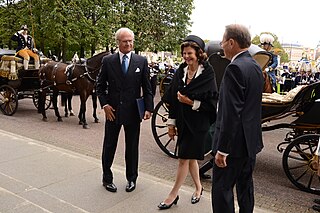
The Opening of the Riksdag Session is an annual ceremony in the Kingdom of Sweden to mark the start of a new parliamentary year for the Swedish Riksdag. The current ceremony was first held in 1975, replacing an older ceremony known as the Solemn Opening of the Riksdag that had been held since the 17th century. It is held every year in September. During the ceremony the monarch declares the new session open and the Prime Minister makes a speech outlining the government’s priorities for the upcoming year.
The 2025 Netherlands budget was presented to the States General on 17 September 2024, a day also known as Prinsjesdag. It was the first budget of the Schoof cabinet and of Minister of Finance Eelco Heinen.

